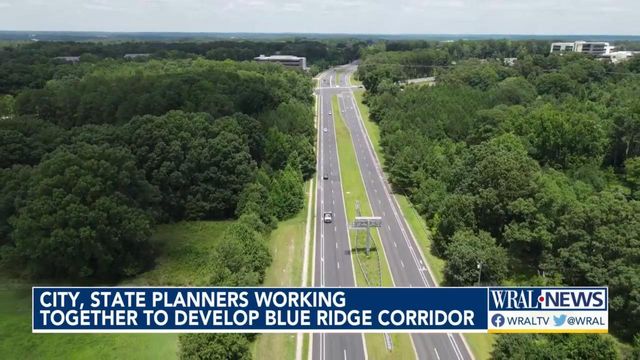PNC facelift, new state buildings spark talk of west Raleigh transformation
As architects draw up plans for a redesign of Raleigh’s PNC Arena, developers, businesses and state government agencies are beginning to reimagine the wider west Raleigh area.
In October, a potential blueprint for developing the property around the hockey and basketball arena will be presented. The prospect of that plan is fueling hopes to shape the so-called Blue Ridge Corridor into the area’s newest growth hotspot.
“Transform what has been a disorganized collection of underutilized government buildings into a new urban center and hospitality center,” said Kristen Hess, the CEO of HH Architecture and vice chair of the Blue Ridge Corridor Alliance, a nonprofit group that formed in 2014 to help steer the development of the area.
The Blue Ridge Corridor is a three-mile area centered around the length of Blue Ridge Road from Western Boulevard to Edwards Mill Road. PNC Arena, Carter-Finley Stadium, the North Carolina State Fairgrounds, the North Carolina Museum of Art, N.C. State University’s veterinary school and UNC Rex Hospital sit within the area. The Blue Ridge Corridor Alliance envisions four distinct districts: health and wellness, arts and research, entertainment and education, and a residential-focused area south of Hillsborough Street.
More than $1 billion in private and public real estate investment has occurred in the area along with nearly $3 billion in city, county and state transportation system investments, Hess said.
It’s a desirable area, one with ample recreational activities, a vibrant cycling community and open space, located in the middle of growing parts of the region. Plans for development have existed for more than a decade.
But much of the land is owned by the state government or state entities, complicating development. The area’s transformation would require significant cooperation from the state, which has restrictions on what it can do with its land.
Already, much of the current activity in the area is government-driven.
The state Department of Health and Human Services is moving its campus to Reedy Creek Road. The first phase of the construction, which includes a 10-story building, is scheduled to be completed in 2024 or 2025. State lawmakers allocated $50 million in the 2021-22 fiscal year and another $60.5 million in the current fiscal year in the budget signed by Gov. Roy Cooper on Monday. Bids for the second and third phases of the project are due later this month.
The Department of Agriculture opened its $94 million, 225,000-square-foot agricultural sciences center at the corner of Reedy Creek and Edwards Mill roads in September. The state-of-the-art building will hold offices and laboratories for four divisions, including food and drug protection, structural pest control and pesticides and veterinary.
The Department of Environmental Quality earlier this year requested bids for renovations to three buildings on its campus at the corner of Reedy Creek and Edwards Mills road. Its water quality building, air quality building and chemistry laboratory will be renovated to “create more effective and efficient use of space,” according to a notice to bidders.
Meanwhile, communications software company Bandwidth is building a five-story building on 40 acres at the corner of Reedy Creek and Edwards Mill roads, a former park and ride location for the fair. As part of the project, the company is building two parking lots to be used for the fair. The $100 million project was facilitated, in part, by a 12-year economic development grant from the state.
The state Museum of Art is set to complete a renovation project by October.
PNC Arena is watching closely, eyeing its own big changes. The 23-year-old arena is due for an interior upgrade, as habits for event-going audiences have changed dramatically since the late 1990s. The upgrades could cost north of the $225-million figure that surfaced in 2020 before the pandemic thwarted plans. The Centennial Authority Board, which owns the arena, could discuss options and costs for interior upgrades in August.
The land around the arena, some of it used for surface parking now, could serve a higher use.
“We’re sitting on a lot of property,” said Carolina Hurricanes’ GM Don Waddell. “When the building was built, if you go back, there was talk about the development of the property, and it never got followed through. We’re sitting on 80 acres, I believe, just on the PNC side. Make it a destination place. Make it a place people want to go to. We don’t have anything like that right now, and I think it would be a huge benefit.”
Waddell said he envisioned several hotels, office buildings, retail centers, mixed housing and parking structures around the arena, which houses the NHL’s Hurricanes and N.C. State’s men’s basketball team. The arena hosts concerts and other events, including its first major esports competition last week. No final decision has been made on what to do around the arena. The board will hear a presentation in October.
“This is becoming yet another part of Raleigh where raw dirt is very valuable,” said Philip Isley, chairman of the Centennial Authority Board, which owns PNC Arena. Isley, an attorney, previously spent eight years on the Raleigh City Council. “It’s also very important to how we grow with all of the other interests coming into the city.”











